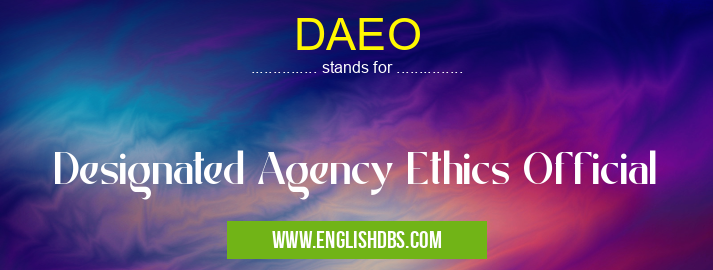What does DAEO mean in US GOVERNMENT
The Designated Agency Ethics Official (DAEO) serves a vital role in ensuring ethical standards are met and maintained within government agencies. As the leader of the agency's ethics program, the DAEO is responsible for making sure employees comply with federal regulations and requirements related to ethical conduct. By providing guidance and support to personnel throughout the organization, the DAEO helps promote ethical decision-making among staff members.

DAEO meaning in US Government in Governmental
DAEO mostly used in an acronym US Government in Category Governmental that means Designated Agency Ethics Official
Shorthand: DAEO,
Full Form: Designated Agency Ethics Official
For more information of "Designated Agency Ethics Official", see the section below.
What Does The DAEO Do?
The primary duty of a DAEO is to oversee and administer an agency's ethics program. To meet this goal, they must ensure that appropriate organizational policies are in place, that staff members understand and adhere to ethical standards, and that any violations are addressed swiftly. This involves continued monitoring of personnel activities, as well reviewing any questionable actions or behavior reported by other employees or supervisors. Furthermore, the DAEO may be called upon to provide advice on how certain situations can be approached ethically in accordance with existing laws and regulations. Additionally, this professional works closely with key personnel across the organization to provide periodic training on ethics issues; helping increase awareness of relevant standards among both management and staff alike.
Essential Questions and Answers on Designated Agency Ethics Official in "GOVERNMENTAL»USGOV"
What is the role of a Designated Agency Ethics Official?
The Designated Agency Ethics Official (DAEO) is responsible for providing advice and guidance to agency employees regarding the highest ethical standards of conduct for their positions. The DAEO administers and implements ethics policies and procedures, provides annual ethics training and serves as a point of contact for all employee inquiries related to ethics.
Who appoints a Designated Agency Ethics Official?
Generally, the head of an agency appoints the DAEO. However, in some cases, designations may be made by other authorized officials, such as an Inspector General or Federal agency counsel.
What are the responsibilities of a Designated Agency Ethics Official?
A DAEO has various responsibilities which include developing regulations governing employee conduct; providing guidance and advice on matters related to financial disclosure requirements; conducting investigations into possible violations of laws, rules and regulations; maintaining records related to ethics programs; issuing periodic reports on ethics-related activities; responding to inquiries from employees about potential conflicts of interest or improper conduct; assisting with enforcement actions or reprimands as necessary; coordinating with other government agencies on matters relating to ethics; and providing help to identify potential gifts or benefits that could create conflicts of interest for employees.
How often does a Designated Agency Ethics Official have to provide training?
The DAEO is expected to provide training at least once per year for all new employees who enter into covered positions, as well as refresher training upon request or when warranted due to changes in applicable laws or regulations.
What type of information should be included in ethics/conflict of interest trainings provided by a Designated Agency Ethics Official?
The type of information covered in an ethical/conflict-of-interest training generally includes topics such as gift acceptance rules, criminal penalties associated with misuse of public funds, financial disclosure requirements (including foreign travel), post-government employment restrictions, conflict-of-interest statutes, political fund raising activities, misuse of position rules and prohibitions against retaliation against whistleblowers.
What happens if an employee fails to comply with ethical guidelines administered by a Designated Agency Ethics Official?
If an employee fails to comply with the ethical guidelines set out by his/her designated agency's official it can result in disciplinary action up to and including dismissal from federal service. Additionally, depending on circumstances civil fines may be imposed against individuals found guilty in violation of ethical standards set forth under law.
Are there any limitations on what a Designated Agency Ethics Official can do?
A DAEO does not have direct authority over individuals outside his/her own agency. Any investigation into allegations concerning another agency's employees must be conducted through either interagency coordination between respective DAEOs or referral back to the appropriate IAO within that other agency. Additionally they cannot impose sanctions directly but must rely on other agencies or departments within their own organization for enforcement action as necessary.
Does a Designated Agency Ethics Official have any special powers?
No special powers are available exclusively to DAEOs however they do possess certain tools at their disposal which allow them fulfill their duties effectively such as access sensitive personnel data which is limited only those with proper clearance granted only at the direction senior management within their organizations.
Can I appeal decisions made by my agency's Designated Agency Ethics Official?
Yes you can file an appeal if you disagree with rulings made by your designated agency's official acting under delegated authority from higher level personnel within your own organization.
Does every federal government agency need its own designated person responsible for administering its ethics program?
Yes every federal government requires its own designated personnel officially responsible administering its own internal ethics program more commonly referred deferd oas “Designatee Agencies Ethics Officials†(DAEOS) per Office Personnel Management (OPM) guidelines.
Final Words:
In today's modern world where ethical considerations often take precedence over legal ones, it is essential for organizations to have adequate oversight from a respected and knowledgeable official like the Designated Agency Ethics Official (DAEO). Through their leadership efforts — from creating applicable policies to providing guidance when needed — these professionals ensure that all personnel remain accountable while upholding ethical standards mandated by governing bodies at all times.
